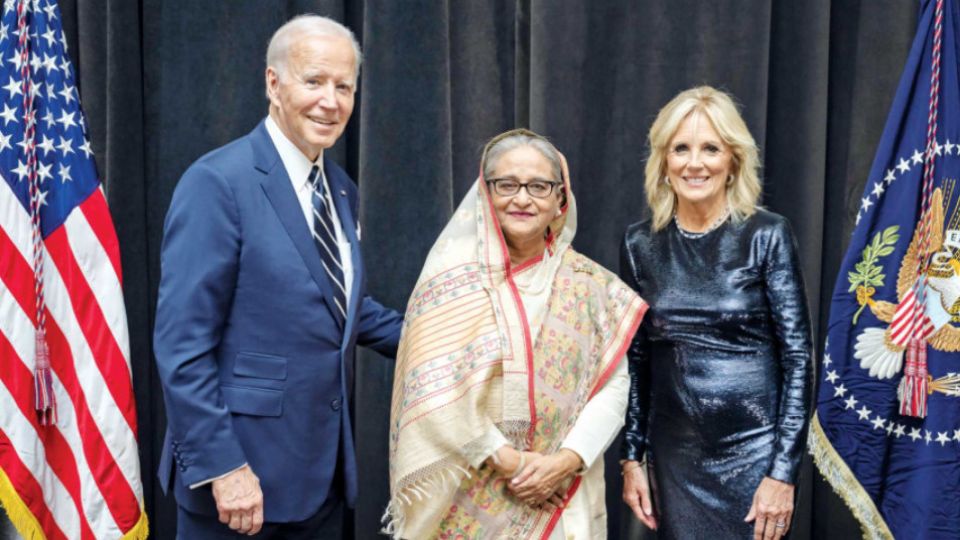September 23, 2022
DHAKA – Prime Minister Sheikh Hasina has called for strong political commitment and global solidarity to face the challenges caused by the Ukraine war and other overlapping crises.
“No single country can tackle these challenges alone. At this moment, what we need the most is strong political commitment and global solidarity,” she said.
The PM was delivering a statement at a roundtable convened by UN Secretary-General António Guterres with the GCRG (Global Crisis Response Group) Champions in New York on Wednesday.
Hasina said the ripple effects of the Ukraine war and other overlapping crises have left deep scars in societies and economies, especially in developing countries.
“This has added many new challenges to our Covid recovery efforts, and SDGs implementation process,” she said.
The premier thanked the UN secretary-general for mobilising the UN system to respond to the crises. In this regard, she commended the work of the GCRG steering committee.
Talking about Bangladesh, Hasina said her government has taken concrete fiscal and monetary measures to ensure macro-economic stability and control inflation.
“Our social-safety-net programmes have been expanded manifolds. There is targeted support for agriculture, MSMEs, and other vulnerable sectors.”
She said the government has also adopted specific plans to increase the share of renewables in the country’s energy mix.
The premier shared six specific thoughts on facing the challenges of the present crises.
First, she said, the world needs to address the volatility of the global financial and economic outlook.
The PM said the G-7, G-20, Organisation for Economic Co-operation and Development, international financial institutions, multilateral development banks should now scale up efforts to address the immediate concerns. “These include lack of SDGs financing, limited fiscal space, declining official development assistance, and debt servicing.”
Second, Hasina lauded the UN secretary-general for his pivotal role in the Black Sea Grain initiative.
“We commit to support any such future initiatives for keeping food production and delivery system out of harm’s way during conflicts.”
Third, the premier said the world needs bold and comprehensive measures to revitalise global trade. “It is imperative to ensure fair share of low and middle-income countries in global trade and export earnings.”
Fourth, she said there should be increased investments in the agriculture sector of developing countries to enhance productivity, and for effective food storage and distribution systems.
“We need more G2G and B2B collaboration for creating new business opportunities, targeted technology support, enhanced official development assistance, and concessional financing.”
Fifth, she said the world needs to make the global architecture for climate cooperation more effective and just.
“We should seize the opportunity of the upcoming COP-27 to address the concerns of the most vulnerable countries. We wish to work with our partners for creating necessary impetus for addressing energy security issue in a comprehensive manner.”
Finally, Hasina said, “We do need to find ways and means to bring an amicable end to this blood-soaked disastrous crisis.”
The sanctions and countersanctions are deeply hurting people around the globe, more so, those in the countries at direct conflict, and those in developing and least developed world, she observed.
PM’S CALLS
The prime minister on Wednesday expressed concern about financial and commercial challenges alongside food and energy crises facing the developing countries in the wake of the pandemic and the Russia-Ukraine war.
She expressed this concern when the executive chairman of World Economic Forum (WEF), Klaus Schwab, paid a courtesy call on her at her place of residence.
Foreign Minister AK Abdul Momen briefed reporters about the day’s activities of the PM on the sidelines of the 77th United Nations General Assembly (UNGA).
Schwab invited the PM to attend the WEF Summit in Davos next January, said Momen.
Besides, the premier held bilateral meetings with Slovenian President Borut Pahor and President of Ecuador Guillermo Lasso at the bilateral booth at the UN Headquarters.


